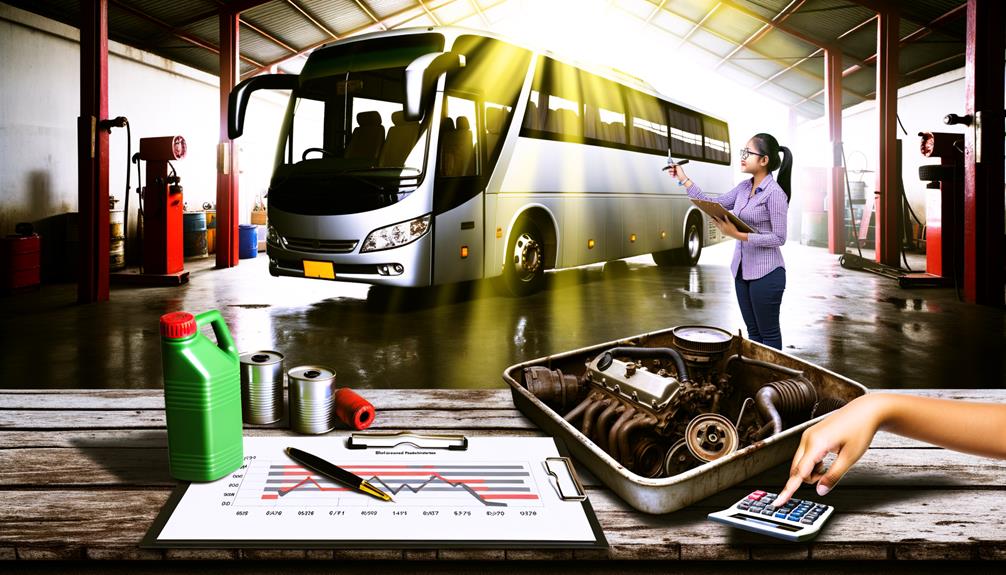10 Essential Tips for Coach Bus Maintenance and Financing
It's funny how a chance encounter at a bus depot can spark a conversation about the importance of coach bus maintenance and financing. You might not think about it often, but keeping your fleet running smoothly is vital for both safety and cost efficiency. With a regular maintenance schedule and quality parts, you can prevent unexpected breakdowns. But that's just the beginning; understanding financing options can further enhance your operations. What other strategies can you implement to guarantee your buses stay in top shape while managing expenses effectively?
Regular Maintenance Schedule
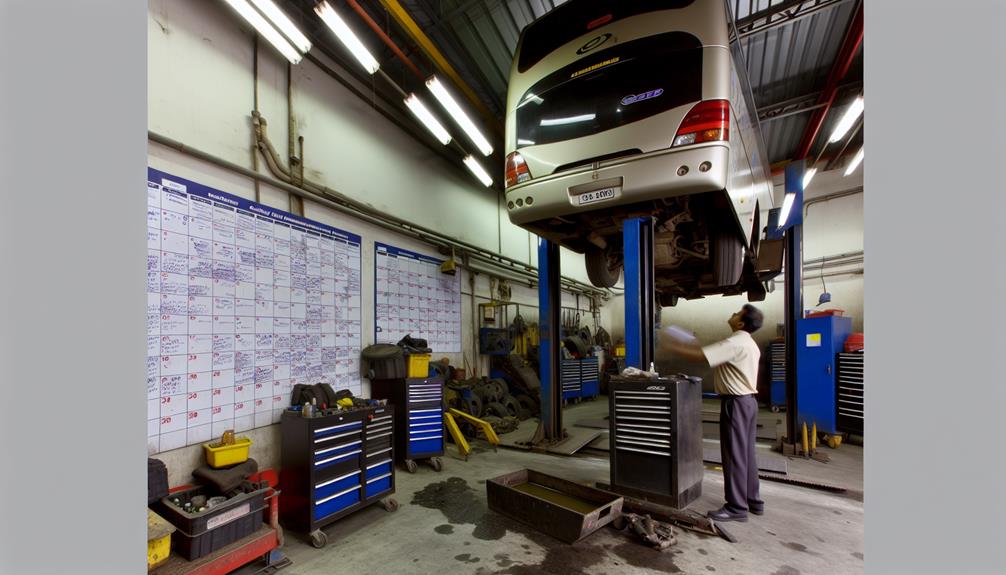
To keep your coach bus running smoothly, it's crucial to set up a regular maintenance schedule. Taking proactive steps through preventive measures not only extends the life of your vehicle but also enhances safety and performance. Start by developing a thorough maintenance checklist that outlines all necessary tasks and their frequencies.
Inspect the engine oil, coolant levels, and brakes monthly, and don't forget to check tire pressure and tread depth to guarantee peak traction. Create a timeline for more extensive services, like replacing air filters and inspecting belts and hoses, every three to six months. By adhering to this schedule, you can prevent small issues from escalating into costly repairs.
Keep detailed records of all maintenance activities to track when tasks were completed and when they're due next. This approach empowers you to stay organized and prepared, allowing for smooth changes between travel schedules. Regular maintenance may seem like a chore, but it grants you the freedom to hit the road with confidence, knowing your coach bus is in top shape. Prioritize these preventive measures, and you'll enjoy a worry-free travel experience.
Importance of Quality Parts
When it comes to maintaining the longevity and performance of your coach bus, the importance of using quality parts can't be overstated. Investing in high-quality components guarantees part durability, which is essential for minimizing downtime and repair costs. Quality parts stand up to the rigors of daily use, providing the reliability you need to keep your bus on the road and your passengers satisfied.
Moreover, part compatibility is critical. When you choose parts designed specifically for your bus model, you're reducing the risk of complications that can arise from using generic or mismatched components. Properly compatible parts work seamlessly with your bus's existing systems, enhancing performance and safety.
Seasonal Preparation Tips
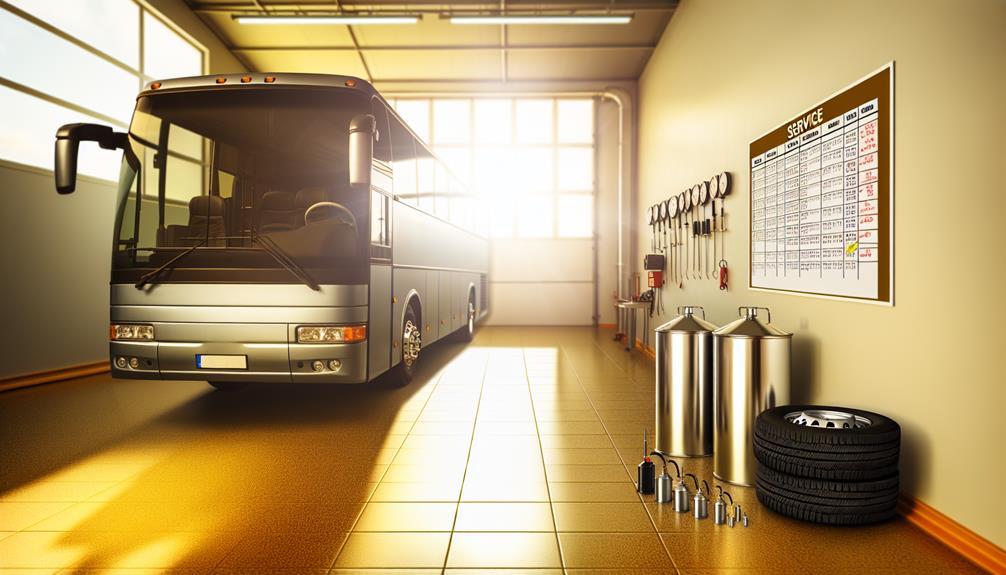
As seasons change, preparing your coach bus for the specific challenges ahead is essential for ideal performance and safety. Each season brings its own set of conditions that can affect your vehicle. Being proactive guarantees that you're ready for anything, from icy roads to sweltering heat.
Here's a quick guide to help you with seasonal preparation:
| Season | Key Actions | Focus Area |
|---|---|---|
| Winter | Check tires, brakes, and battery | Winter readiness |
| Spring | Inspect wipers and fluids | Overall maintenance |
| Summer | Conduct thorough inspections | Summer inspections |
For winter readiness, make sure to check your tire tread and antifreeze levels. In spring, inspect the wipers to guarantee clear visibility during rain. Summer inspections should include air conditioning functionality and cooling system checks to prevent overheating.
Fuel Efficiency Strategies
Fuel efficiency plays an essential role in the operational costs of running a coach bus. To enhance fuel efficiency, start with proper engine tuning. Regular checks and adjustments guarantee your engine operates at peak performance, which can lead to significant savings over time. Make certain you're using the right fuel type and that your air filters are clean; these small changes can yield noticeable improvements.
Weight management is another vital aspect. Consider the cargo you're carrying and avoid unnecessary weight. Every extra pound requires more fuel, so encourage passengers to travel light, and regularly review the bus's equipment for any items that can be removed or stored elsewhere.
Additionally, maintaining ideal tire pressure plays a part in fuel efficiency, as under-inflated tires can increase drag and decrease mileage. Plan routes to avoid heavy traffic and reduce idling time, which also contributes to wasted fuel.
Tire Care and Inspection
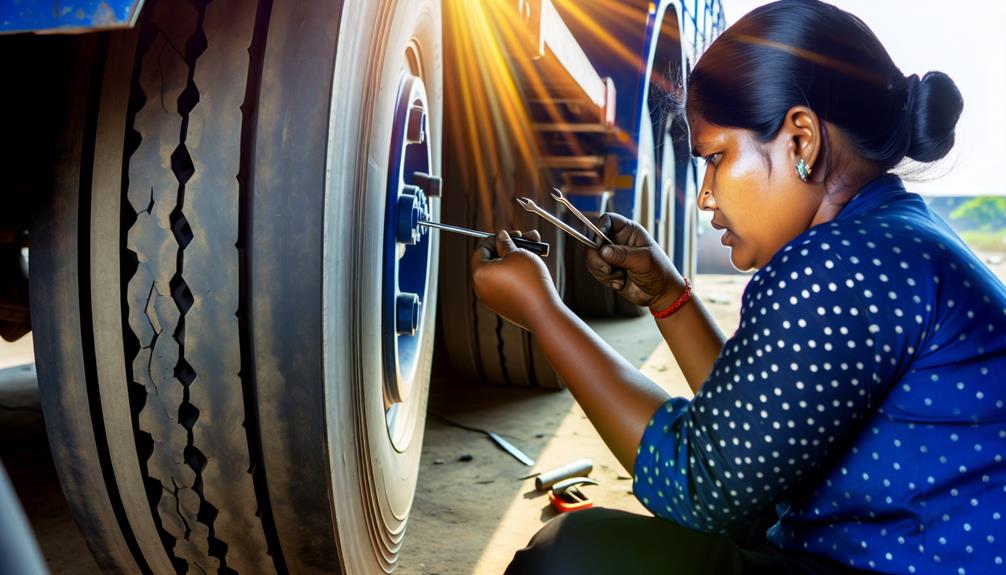
Regular tire care and inspection are essential for ensuring the safety and efficiency of your coach bus. Start by monitoring the tread depth regularly; it plays a critical role in traction and handling. Use a tread depth gauge to measure it—aim for at least 4/32 of an inch for safe operation. If you find the tread wearing unevenly, it could indicate alignment issues or improper inflation.
Next, don't overlook tire rotation. Rotating your tires every 6,000 to 8,000 miles helps promote even wear, extending their lifespan and enhancing performance. Typically, you should rotate the front tires to the back and switch the rear tires to the front, ensuring a consistent grip on the road.
Additionally, inspect the sidewalls for any signs of damage, such as cracks or bulges. These can lead to serious issues if left unaddressed. Always maintain proper tire pressure as well—under-inflated tires can cause overheating and blowouts, while over-inflated ones can wear out quicker.
Brake System Maintenance
Guaranteeing your coach bus's brake system functions flawlessly is fundamental for passenger safety and overall vehicle performance. Regular brake maintenance is essential to keep all brake components in prime condition. Start with a thorough brake inspection, checking the brake pads for wear and confirming they're not excessively worn down. If you notice any signs of wear, don't hesitate to schedule a brake replacement.
Monitor your brake fluid levels, as low fluid can lead to compromised brake performance. Replace brake fluid as recommended by the manufacturer to prevent moisture buildup and corrosion. Additionally, pay attention to brake sensors, which can provide significant information about your braking system's status.
If you experience any unusual noises or decreased responsiveness when braking, it's time to investigate further. Regularly maintaining your brake system not only enhances safety but also extends the lifespan of your vehicle. By prioritizing these checks, you'll guarantee that your coach bus remains reliable and ready for the open road, allowing you the freedom to transport passengers with confidence. Remember, a proactive approach to brake maintenance can save you from costly repairs down the line.
Electrical System Checks
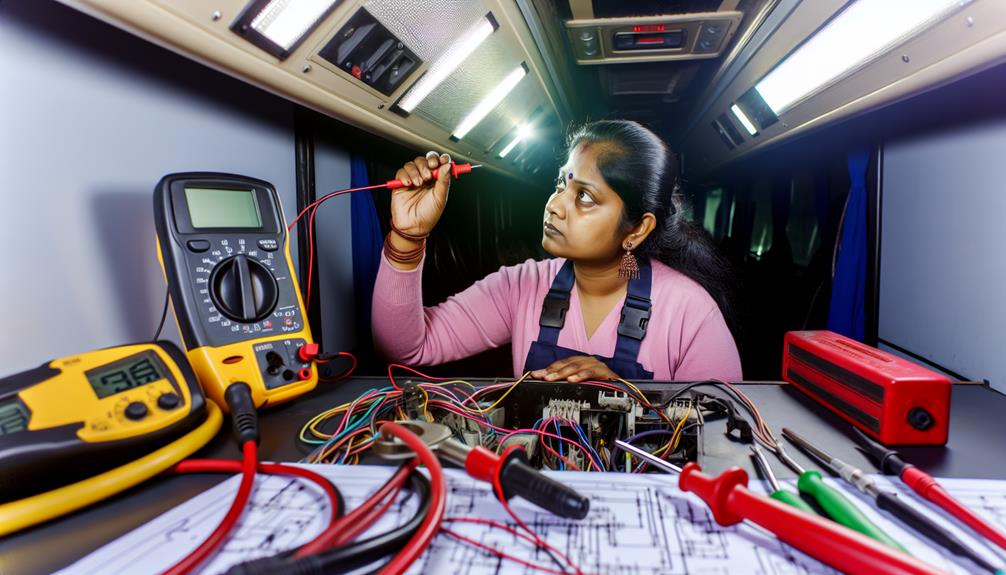
A thorough electrical system check is vital for the reliable operation of your coach bus. Start with a battery inspection. Check the terminals for corrosion and confirm they're tightly connected. A weak battery can lead to unexpected breakdowns, so test its voltage regularly and replace it if it's below ideal levels.
Next, perform a wiring assessment. Examine all wiring for signs of wear, fraying, or damage. Pay special attention to connections and insulation, as these can lead to short circuits or system failures. Confirm that all wires are properly secured, as loose wiring can cause intermittent issues that are hard to diagnose.
Don't forget to check the fuses and relays; they play a significant role in the electrical system's reliability. If you suspect any irregularities, replacing faulty components promptly can save you from larger repairs down the line.
Financing Options Overview
When it comes to managing the costs of coach bus maintenance, understanding your financing options is essential for making informed decisions. You'll find two primary paths: lease agreements and loan options. Each has its unique advantages and considerations, allowing you to tailor your approach to fit your financial strategy and operational needs.
Leasing can provide flexibility, enabling you to acquire a coach bus without a significant upfront investment. With lease agreements, you typically make lower monthly payments, which can help preserve cash flow for other essential expenses like maintenance and repairs. Additionally, maintenance packages are often included in leases, reducing the hassle of managing upkeep.
On the other hand, loan options allow you to own the bus outright once the loan is repaid. This can be beneficial if you plan to keep the bus long-term, as you won't face ongoing lease payments. However, loans often require larger down payments and may involve higher monthly installments.
Ultimately, weighing these financing options carefully will empower you to choose the best route, giving you the freedom to focus on what truly matters—efficiently operating your coach bus business.
Budgeting for Repairs
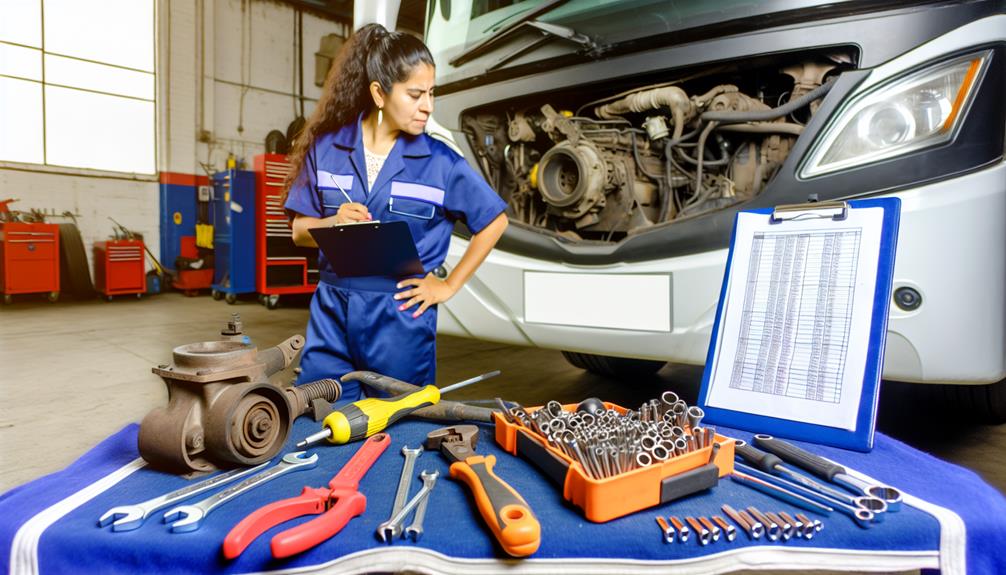
While unexpected breakdowns can disrupt operations, budgeting for repairs is essential to maintaining the longevity and reliability of your coach bus. Start by estimating your repair costs based on a thorough maintenance checklist. This can help you identify common issues and their associated expenses, allowing you to plan accordingly.
Setting up an emergency fund for unexpected expenses is vital. Aim for a reserve that can cover at least a few months of potential repairs. This fund provides peace of mind and prevents financial strain when urgent repairs arise. Utilize budgeting software to track your expenses and adjust your budget as needed.
Don't overlook the importance of repair warranties. They can greatly reduce out-of-pocket costs for major repairs, so always inquire about warranty options when handling repairs.
Long-term budgeting is key. Allocate a portion of your budget each month specifically for repairs, ensuring you're prepared for future maintenance needs. Finally, implement repair prioritization; tackle the most critical repairs first to maintain safety and efficiency. By being proactive in your budgeting, you empower yourself to keep your coach bus running smoothly, enhancing your operational freedom.
Insurance Considerations
Understanding insurance considerations is vital for safeguarding your investment in a coach bus, as the right coverage can protect you from substantial financial losses. First, assess your liability coverage needs. This type of insurance is important, as it shields you from legal claims that may arise from accidents or injuries involving your bus. Make sure you have adequate limits to cover potential damages, which can be significant.
Next, familiarize yourself with the claims process. Knowing how to navigate this system can save you time and stress when you need it most. Establish a relationship with your insurance provider and ask about their claims procedure, so you know what steps to take if an incident occurs. Document everything related to your bus's maintenance and any incidents that may arise, as proper records can expedite claims.
Lastly, consider additional coverage options, like extensive and collision insurance, to further protect your investment. By understanding these insurance considerations, you can make certain your coach bus remains a source of freedom and opportunity, rather than a financial burden. Prioritize your coverage needs to drive confidently and focus on the journey ahead.
https://myprevost.net/wp-content/uploads/2024/09/728x90.jpg
